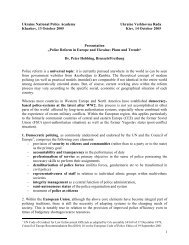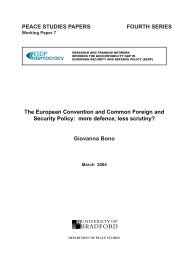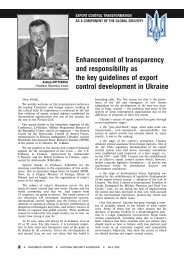The Challenges and Opportunities of Security Sector Reform in Post ...
The Challenges and Opportunities of Security Sector Reform in Post ...
The Challenges and Opportunities of Security Sector Reform in Post ...
You also want an ePaper? Increase the reach of your titles
YUMPU automatically turns print PDFs into web optimized ePapers that Google loves.
2.2.4. <strong>The</strong> Youth Question<br />
<strong>The</strong> role <strong>of</strong> the youth <strong>in</strong> the Liberian conflict has been widely discussed. Indeed, <strong>in</strong> the<br />
view <strong>of</strong> some analysts the most pert<strong>in</strong>ent problem is the challenge <strong>of</strong> unemployment that<br />
faces the demobilised young men <strong>and</strong> women. 47 Given Liberia’s demographic structure<br />
(with half the population be<strong>in</strong>g under 30 years <strong>of</strong> age) with<strong>in</strong> a context <strong>of</strong> widespread<br />
deprivation <strong>and</strong> lack <strong>of</strong> economic opportunities for the youth, the reality is that the youth<br />
represent an available recruitment pool for spoilers. In this regard, Charles Taylor’s<br />
reputed f<strong>in</strong>ancial fortune <strong>of</strong> $150 million-$210 million would be difficult for Liberian<br />
youth to resist <strong>in</strong> an economy with 85% unemployment. This has direct implications for<br />
the state <strong>of</strong> security <strong>in</strong> general, <strong>and</strong> for the viability <strong>and</strong> susta<strong>in</strong>ability <strong>of</strong> security sector<br />
reform <strong>in</strong>itiatives which may be put <strong>in</strong> place as part <strong>of</strong> post-conflict reconstruction. In<br />
deal<strong>in</strong>g therefore with freedom from fear, due attention would need to be given to the need<br />
for freedom from want among such a critical section <strong>of</strong> the Liberian population.<br />
3. <strong>Security</strong> <strong>Sector</strong> Reconstruction: ‘We Want America.<br />
America Should Come Help Us’!<br />
This section focuses on the governance <strong>of</strong> the security sector <strong>in</strong> Liberia <strong>and</strong> a prelim<strong>in</strong>ary<br />
overview <strong>of</strong> post-conflict reconstruction <strong>of</strong> the security architecture. Thus, there is a<br />
focus on the process, policies <strong>and</strong> adm<strong>in</strong>istration <strong>of</strong> the security sector by various<br />
Liberian governments. <strong>The</strong> aim <strong>in</strong> this section is to consider how the Liberian state has<br />
related with security sector structures <strong>and</strong> processes, <strong>and</strong> the extent to which these reflect<br />
the tw<strong>in</strong> imperatives <strong>of</strong> effectiveness <strong>and</strong> oversight.<br />
To be sure, a major source <strong>of</strong> the dysfunctionality <strong>of</strong> the security sector <strong>in</strong> Liberia is that<br />
the armed <strong>and</strong> security forces have all through the country’s history functioned as<br />
<strong>in</strong>struments for regime <strong>in</strong>terests as opposed to the <strong>in</strong>terests <strong>of</strong> the general populace. As<br />
such, their role has essentially been repressive, given the wide gap between regime<br />
<strong>in</strong>terests <strong>and</strong> popular <strong>in</strong>terests. <strong>The</strong> first elements <strong>of</strong> security forces were the created <strong>in</strong><br />
the ‘home guards’ which were set up to protect the settlers from the <strong>in</strong>digenous<br />
communities <strong>and</strong> to secure the compliance <strong>of</strong> the <strong>in</strong>digenous population with the<br />
authority <strong>and</strong> orders <strong>of</strong> the settler state. By 1908, the ‘home guards’ evolved <strong>in</strong>to the<br />
Liberian Frontier Force (LFF), which was later to transform <strong>in</strong>to the Armed Forces <strong>of</strong><br />
Liberia (AFL). Apart from police <strong>and</strong> customs functions <strong>in</strong> the h<strong>in</strong>terl<strong>and</strong>, the LFF<br />
became necessary to ward <strong>of</strong>f challenges over the <strong>in</strong>digenous populations from France<br />
<strong>and</strong> Brita<strong>in</strong>. With forced recruitment methods, the LFF was used as an <strong>in</strong>strument for<br />
promot<strong>in</strong>g the expansionist policies <strong>of</strong> the settler state. It was essentially a colonial<br />
construct. As Jaye has noted:<br />
14<br />
<strong>The</strong> <strong>in</strong>itial context for security th<strong>in</strong>k<strong>in</strong>g was driven by the need to secure settler<br />
supremacy over the <strong>in</strong>digenous African populations, ward <strong>of</strong>f colonial claims to<br />
Liberian territories <strong>and</strong> <strong>in</strong>evitably, susta<strong>in</strong> the exist<strong>in</strong>g status quo. Thus, like colonial<br />
47 See, for example, Kayode Fayemi, ‘Govern<strong>in</strong>g Insecurity <strong>in</strong> <strong>Post</strong>-Conflict States: <strong>The</strong> Case <strong>of</strong> Sierra Leone <strong>and</strong><br />
Liberia’ <strong>in</strong> Alan Bryden <strong>and</strong> He<strong>in</strong>er Hänggi (eds.), <strong>Reform</strong> <strong>and</strong> Reconstruction <strong>of</strong> the <strong>Security</strong> <strong>Sector</strong>, DCAF,<br />
Geneva, 2004.

















